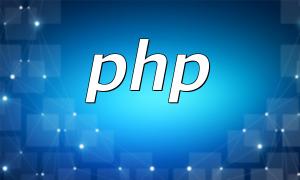PHP is a widely used server-side scripting language for web development. Its open-source nature, flexibility, and efficiency make it a popular choice among developers. In real-world projects, mastering techniques for efficient implementation can boost productivity, enhance performance, and improve security. This article shares hands-on PHP development tips across four key areas: database operations, performance optimization, security, and coding practices.
Database operations are at the heart of PHP development. With proper optimization, you can ensure both high performance and robust security.
Using PDO Prepared Statements: PDO (PHP Data Objects) prepared statements help prevent SQL injection attacks. By using the prepare() method and binding parameters with bindParam() or bindValue(), developers can avoid security issues caused by untrusted input.
Database Connection Pooling: Opening and closing database connections repeatedly consumes significant resources. Connection pooling allows pre-established connections to be reused, improving response times and reducing overhead.
Query Optimization: Proper indexing, avoiding “SELECT *”, minimizing subqueries, and optimizing WHERE clauses can greatly reduce database load and improve query performance.
Website performance directly affects user experience. Both backend and frontend optimizations play critical roles in achieving faster load times and smoother interactions.
Caching Strategies: Using in-memory caching systems like Redis or Memcached helps store frequently accessed data, reducing database queries and speeding up responses.
Frontend Optimization: Frontend improvements such as compressing CSS and JS files, combining HTTP requests, and using CDNs can significantly reduce page load times.
PHP Opcode Caching: Enabling extensions like OpCache or APC stores compiled PHP scripts in memory, eliminating the need for repeated compilation and improving execution speed.
Security is an essential aspect of PHP development. Implementing proper safety measures helps prevent data breaches and system exploitation.
Input Validation: Always sanitize user input to prevent XSS or SQL injection attacks. Functions like filter_var() and htmlspecialchars() can effectively clean and validate data.
Secure File Uploads: When allowing file uploads, always validate file type, size, and destination to prevent malicious uploads or script execution.
Secure Session Management: Sessions store sensitive user data and must be protected using HTTPS, regular session ID regeneration, and anti-session fixation strategies.
Clean, organized, and maintainable code ensures scalability and long-term project stability. The following tips help developers write better PHP code.
Using Namespaces: Namespaces help organize large projects and prevent naming conflicts between classes and functions, resulting in cleaner architecture.
Exception Handling: Use try...catch...finally blocks to catch and manage exceptions gracefully, preventing system crashes and improving reliability.
Autoloading Classes: The spl_autoload_register() function enables automatic class loading, eliminating the need for manual includes and improving code maintainability.
These PHP development practices cover database operations, performance optimization, security, and code organization. By applying these techniques thoughtfully, developers can build efficient, secure, and scalable web applications. Continuous learning, practice, and adaptation to new technologies are essential for becoming a proficient PHP developer.










